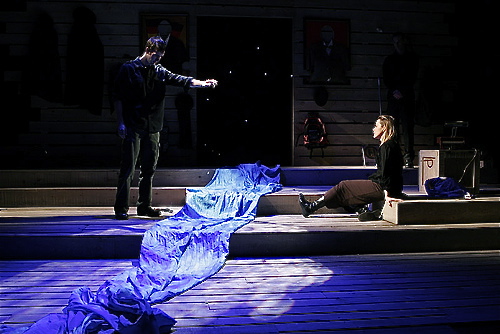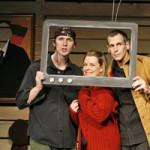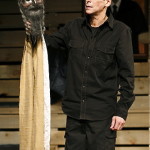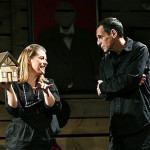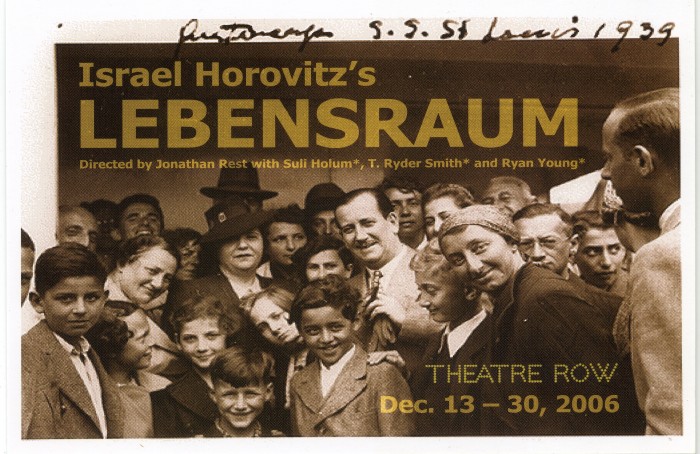Photos by Richard Termine
Above: Suli Holum, Ryan Young, T. Ryder Smith
Excerpts from the reviews
Full reviews are below
“The most exciting thing about the new production of Israel Horovitz’s Lebensraum is the tour de force acting of its three players. I mean it: T. Ryder Smith, Suli Holum, and Ryan Young are doing extraordinary work in this show, and their performances are not to be missed. I didn’t count how many characters they portray here, but I can easily and gladly remember some of the most unforgettable ones: a German engineering professor who daringly reveals that he’s a neo-Nazi, and a gay Jewish Frenchman hoping to emigrate to Germany (Young); a cheerful, if overworked, middle-aged Berliner, caring for her aged mother, and a militant Israeli woman who is determined to ensure that her generation of Jews won’t be anybody’s victims (Holum); and, perhaps most memorably, a pair of 80-something-year-old Concentration Camp survivors who hate each other but nevertheless emigrated and remained in the same remote Australian town for half a century (Smith, who plays them both at the same time at one point). These and many others are rendered vividly by this trio of remarkable actors: the heart of Lebensraum is this controlled cacophony of disparate, divergent voices, all of whom want nothing more than the elusive promise of the play’s title—literally, “living room”: a place of one’s own.” Martin Denton, nytheatre.com
“The inventive, at times almost whimsical, production invigorates the difficult subject without belittling or simplifying it. . . . Intellectually, it’s exciting to watch these trinkets fill the theater. Each pulses with individual meaning, and together they display the Holocaust’s continuing power. The cast leaps quickly from role to role, able to give each character a distinct voice and posture. . . .This is not a collection of archetypes, but a stage full of specific characters who also have symbolic heft. There may be too many barriers to let the show pierce the heart, but there’s still value in such an accomplished display of artistic intelligence.” Mark Blankenship, Variety
Drama Desk award
For Outstanding Ensemble Cast
For more, see awards page here.
Publicity
Jewish Daily Forward, Cara Joy David – What would happen if, in our time, a German chancellor urged 6 million Jews to relocate to Germany? That is the question posed by Israel Horovitz’s play “Lebensraum,” which will enjoy a limited engagement at off-Broadway’s Kirk Theatre at Theatre Row from December 13 through December 30.
In “Lebensraum,” a German chancellor does indeed make the entreaty mentioned above, promising all Jewish immigrants citizenship and employment. The play features a cast of three actors (T. Ryder Smith, Suli Holum and Ryan Young) portraying more than 80 characters, including a laid-off Jewish dock-worker who travels from Massachusetts to Bremerhaven; an Auschwitz survivor who returns to Berlin to find the woman who betrayed his family to the Nazis; a young German girl who falls in love with one of the new citizens, and many others. With the influx of inhabitants, many native Germans are displaced, much to their displeasure.
“Lebensraum” marks the start of a busy time for Horovitz, who has about 50 full-length stage works to his credit as well as screenplays for numerous films. In January 2007, after “Lebensraum” closes, the small Barefoot Theatre Company will present “Israel Horovitz’s New Shorts,” a compilation of nine new Horovitz plays, at the 78th Street Theatre Lab. Then, in February, the producing wing of The New York Playwrights Lab, a society of scribes founded by Horovitz in 1975, will launch with the premiere of the author’s “The Secret of Mme. Bonnard’s Bath” on Theatre Row. Because it kicks off this loose celebration, this staging of “Lebensraum” is of particular import.
“Some of [my plays] are quite good, some of them are less than quite good. I think that ‘Lebensraum’ is quite good,” Horovitz said in an interview before acknowledging ‘that opinion and $1 will buy you a copy of the Forward.”
In the late 1800s, the word Lebensraum, which means “living space,” came to represent an ideology that held there was not enough room for the expansion of the German people. Adolf Hitler embraced this philosophy and used it to justify his expansionist principles.
Horovitz was inspired to write “Lebensraum” after he took a particularly disturbing journey to Germany more than a decade ago. Although Germany is seen by many as one of the least antisemitic countries in Europe today, Horovitz’s experience was different. There to see productions several of his plays, he remembers meeting an actress who told him: “You can’t have Jewish character in plays in Germany… it doesn’t ‘smell’ good.” This led him to have a discussion with his German translator, a young woman who had grown up knowing not a single Jew. Horovitz learned that it had been hard for her traveling the world, because of anti-German sentiment after the war.Horovitz began to believe that Germans of her generation would one day think, “These abstract Jews are causing me a lot of trouble.” It was exactly the sort of sentiment that, he thought, could lead to another Holocaust — and trying to evoke it in modern terms became the goal for this play.
If the piece sounds too serious to bear, it’s not all Sturm und Drang. There are many light moments — including one in which an actor simultaneously plays two elderly Jews in the midst of an argument — and good deal of the play’s humor draws on old-time shtick (“He opened a business as a Mr. Fix-It,” one character says. “He should have called his business Mr. Break-It-Worse!”).
“It’s a blend of comedy and tragedy,” Horovitz said. “I don’t think the subject can be treated with somber seriousness and still find an audience.”
The play, first produced almost a decade ago, has been presented all over the world. While it is about a particular people, the events portrayed could happen to anyone. “The threat of genocide is universal, and the play incorporates universal themes in an intensely entertaining way to make this very point,” noted Jonathan Rest, who directed the piece. “‘Lebensraum’ is about fear of people different from ourselves. Given what’s going on in our country and in the world, can you think of a more timely and important topic?” 12.8.06
Full reviews
nytheatre.com review, Martin Denton – The most exciting thing about the new production of Israel Horovitz’s Lebensraum is the tour de force acting of its three players. I mean it: T. Ryder Smith, Suli Holum, and Ryan Young are doing extraordinary work in this show, and their performances are not to be missed. I didn’t count how many characters they portray here, but I can easily and gladly remember some of the most unforgettable ones: a German engineering professor who daringly reveals that he’s a neo-Nazi, and a gay Jewish Frenchman hoping to emigrate to Germany (Young); a cheerful, if overworked, middle-aged Berliner, caring for her aged mother, and a militant Israeli woman who is determined to ensure that her generation of Jews won’t be anybody’s victims (Holum); and, perhaps most memorably, a pair of 80-something-year-old Concentration Camp survivors who hate each other but nevertheless emigrated and remained in the same remote Australian town for half a century (Smith, who plays them both at the same time at one point). These and many others are rendered vividly by this trio of remarkable actors: the heart of Lebensraum is this controlled cacophony of disparate, divergent voices, all of whom want nothing more than the elusive promise of the play’s title—literally, “living room”: a place of one’s own.
The premise of the play is set forth almost as soon as the lights go down, when the Chancellor of Germany, one Rudolph Stroiber, makes this astonishing announcement: I extend an invitation to six million Jews from anywhere in the world to come to live their lives in Germany. I speak to you, now: You will be given citizenship and full privileges in this great nation. You will be German. It is my heartfelt desire to re-establish a Jewish community in Germany, and to reduce, as much as humanly possible, the immeasurable shame we Germans feel each day of our lives for what this country did to our German-Jewish neighbors, 60 years ago.
At the center of Horovitz’s singular story is an American family, the Linskys, from Gloucester, Massachusetts. Mike, an unemployed dockworker, thinks the Chancellor’s offer is mighty attractive and, with his wife Lizzie and teenaged son Sam, makes the move to Germany. It turns out that they are the first Jews to arrive under the program (or at least they’re so designated), and they quickly become media stars. Mike finds work in the economically depressed town of Bremenhaven, where he eventually has to confront the prejudices (old and new) of the dispossessed locals. Sam, meanwhile, discovers the stirrings of first love in the person of Anna Giesling, a German girl at his school with whom he quickly and irrevocably bonds. Young and Holum portray Sam and Anna, beautifully capturing the innocence and hopefulness of these characters, who represent the future, a world where—is it possible?—Germans and Jews find lasting harmony.
Is it possible? Horovitz postulates a wondrously idyllic notion and then pokes holes in it as the often ugly realities of human nature and political behavior assert themselves. (It’s hard to imagine, in fact, that a world leader could be as apparently naive as Stroiber and actually get elected nowadays.) Suffice to say that the grand experiment does not proceed as planned; as in life, there’s no pat ending here, or even a conclusion—just the sense that the world will keep spinning and some people will learn from history and others won’t, that some will reach out with love and generosity while others will live only for justice (or vengeance: two sides of the same coin, right?). In its wisdom, Lebensraum feels deeply moving and at the same time unsatisfying. But that’s the world cheating us of a neat and easy ending, not the playwright.
Jonathan Rest’s staging is excellent, keeping the focus squarely on the performers, who manage changes of scenery and costume with split-second precision as they propel the complex narrative forward. Susan Zeeman Rogers is responsible for the numerous simple sets and props, while Esther Arroyo provided the splendidly indicative costumes. Lighting and sound, equally invaluable elements of the whole here, are by Christopher Bailey.
Horovitz has written into his script a bare-bones, Our Town-y feel to the piece, with all the stage machinery showing, the better to remind us that ultimately Lebensraum is a theatrical allegory. In the more than capable hands of Smith, Holum, and Young, many important truths are revealed to us with great honesty, humanity, and compassion. 12-17-06
Variety, Mark Blankenship – Barefoot Theater Company begins a three-month, three-play celebration of scribe Israel Horovitz by staging his play “Lebensraum,” a fable which examines the Holocaust but takes the less traveled road by exploring how that atrocity still echoes through modern Jewish and German communities. The inventive, at times almost whimsical, production invigorates the difficult subject without belittling or simplifying it. Still, there’s a contradiction between the script’s subject and its approach. On the one hand, the multiple, interconnected stories are punctuated by observations that the Holocaust has become “distant, abstract, (and) impersonal” in contemporary culture. Horovitz argues that codifying Nazi violence in films and history classes dulls the horror, and the lessons of the Holocaust could be forgotten if they get robbed of their urgency. Yet “Lebensraum” is designed to make us feel safe. It’s an enjoyable evening in the theater, which would seem to make it part of the problem. To begin with, the entire plot sounds like a fairy tale. After having a prophetic dream, a fictional German chancellor invites 6 million Jews to move back to Germany to “replace” those killed by the Nazis. But when the “new citizens” arrive, the country explodes with anger, grief and shame. The nation’s feelings are depicted via characters whose lives overlap with a symbolic resonance only found in fiction. For instance, an American Jewish dockworker (T. Ryder Smith) moves his son and Christian wife to Germany, only to become the national face of the homecoming project. He’s given a job on a dock, which incenses the unemployed natives. One local man — portentously, he’s also a dockworker and also played by Smith — leads a protest that turns violent, and both the American and the German reveal vicious prejudices. Meanwhile, their children meet at a bus stop and fall innocently in love. Metaphors abound. Although the cleverness of Horovitz’s story can be appreciated, his structural choices are too obvious. It’s hard to be moved by something so clearly contrived. Horovitz adds more emotional distance by using a narrator. Three actors play every role, and one of them is constantly stepping out of character to relate things like: “They hated each other” or “Not everyone in Germany was smiling.” With the tension described instead of performed, it becomes exactly what the play criticizes — distant, abstract, and impersonal. However, the production does have an engaging theatrical imagination. In an effective device, once actors use a prop, they hang it on the set’s bare wooden walls or leave it on the stage floor. Smith sometimes becomes the chancellor by sticking his head through a portrait with the face cut out. It reminds us that even cultural healing can be a phony political act.
There’s also a plaster mask representing a man who gets killed at a rally to insist that loss will always litter the world. Intellectually, it’s exciting to watch these trinkets fill the theater. Each pulses with individual meaning, and together they display the Holocaust’s continuing power. The cast leaps quickly from role to role, able to give each character a distinct voice and posture. Esther Arroyo’s costumes enhance their work by letting one expressive item — a girlish headband, a weather-beaten cap — reflect a character’s life.
Director Jonathan Rest gives a relaxed pace to each scene, so that the actors have time to savor the detail in Horovitz’s writing. This is not a collection of archetypes, but a stage full of specific characters who also have symbolic heft. There may be too many barriers to let the show pierce the heart, but there’s still value in such an accomplished display of artistic intelligence. 12-18-06
BroadwayWorld.com, Michael Dale – Lebensraum: An Unusual Homecoming. Israel Horovitz’s Lebensraum begins with the present day chancellor of Germany, Rudolph Stroiber, deciding to make amends for the Holocaust by inviting 6 million Jews from anywhere in the world to come to his country, where they’ll be given jobs and granted automatic citizenship. After that, it starts getting weird. Horovitz got the inspiration for this 1996 play, now enjoying a very moving and well-acted production at the Kirk, on a trip to Germany where he found that a production of one of his plays cut a line which referred to a character as being Jewish. Being told, “You can’t have a Jewish character in plays in Germany… it doesn’t ‘smell’ good,” led him to explore the country’s distinct absence of anything that suggests a Jewish presence and the anti-German sentiment felt by post-war citizens when traveling abroad. Horovitz depicts modern day Germany as a country filled with youth who were not educated in what was happening during the 1930’s through the mid-40’s and don’t understand why the rest of the world blames them for what they believe to be the actions of a small radical faction. The title was taken from the German word for “living space,” the policy name used by Hitler to justify his invasion of neighboring nations to make more room for his countrymen. Under director Jonathan Rest, a skilled trio of actors (Suli Holum, T. Ryder Smith and Ryan Young), all of whom remain on stage throughout, quickly bounce between narrating and performing over 80 roles in the complicated plot of interwoven stories. If not for the subject matter I might describe their performance as a vaudeville, as Horovitz and Rest, along with set and prop designer Susan Zeeman Rogers and costume designer Esther Arroyo, hand out even doses of drama and humor. Naturally, the unemployed German citizens are the first to object to “Project Homecoming,” as the plan is called, seeing no reason why they should be made to pay for actions taken before they were even born. There is also a violent reaction in Israel when a religious leader suggests taking the Germans up on their offer, while suspicious Jews form an underground army to make sure this is not a trick to kill more of their people. The main storyline concerns an American family from Gloucester, Massachusetts who come to Germany because the dockworker father hasn’t had a job in two years. Mike Linsky, his wife Lizzie and their fifteen-year-old son Sam are the first “official” Jews to be welcomed into Germany (a gay French couple who arrive before them were told their papers weren’t quite in order yet) and the government makes sure they become media celebrities in an effort to show the world how well the project is going. (There’s an inside joke regarding Sam being a big fan of The Beastie Boys; one of its members being the author’s son, Adam Horovitz.) Ryan Young and Suli Holum do their best work as Sam and his classmate Anna, who soon becomes his girlfriend. Their tentative scenes of courtship as they try and understand each other’s culture are quite touching and warmly humorous. Anna has never known a Jew before and doubts if she’s ever read a book by a Jew, heard music by a Jew nor has had any contact with anything Jewish. It was only recently, when her teachers revolted against the practice of not teaching about the Holocaust, that Anna learned how ordinary Germans would turn over Jews to the Nazis.
One such German was Uta Krebs, who was responsible for young Max Zylberstein losing his entire family to the death camps. Seventy years later, Max has returned to Berlin to seek his unusual revenge. T. Ryder Smith, who gives an exceptionally detailed performance with each of his characters, is positively chilling in a monologue where Max finally gets to confront the woman who, at age 15, changed his life forever because she was jealous of his nice clothes. Though its premise seems more than a bit outlandish and further suspension of disbelief is required to accept some of the plot twists and outcomes, Lebensraum is filled with intriguing moments, making for a thought-provoking and very satisfying evening. 12-18-06
Backstage, Andy Propst – Imagine that in attempting to assuage the shame of his nation, a German chancellor were to invite six million Jewish people to his country. The implications of such an idea are enormous. In Lebensraum, Israel Horovitz explores this conceit in less than 95 minutes. The play unfolds on Susan Zeeman Rogers’ tiered wooden set, which is backed by a slatted wood wall ominously reminiscent of that of a boxcar. After the fictitious chancellor announces his plan, violence erupts in Germany and Israel resulting in two deaths, which are shockingly brought to life by the performers using beautifully crafted masks. Lebensraum then follows three stories (a fourth is a cheap throwaway about French gay men being the first to arrive only to be sent home). In one plot line, an unemployed dockworker in Massachusetts decides to relocate his wife and teenage son, reasoning that the offer would not have been made if there were no work available. A second follows a concentration-camp survivor who returns looking for the woman who reported his family to the Nazis. A third involves a teenage German girl who falls in love with the American boy as her father and coworkers are displaced by rapidly arriving Jews. Using just a few costume accessories (from designer Esther Arroyo), Suli Holum, T. Ryder Smith, and Ryan Young shift among multiple characters with precision, adopting new body language and accents rapidly and convincingly. They navigate Horovitz’s intricately interwoven comic tragedy with grace. The production, under Jonathan Rest’s direction, moves splendidly until its final 20 minutes, when Horovitz brings his stories to dramatic conclusions that feel forced and, in the cases of the teen romance and worker strife at the docks, are realized too quickly. There’s an ambition at work here that deserves more stage time. Lebensraum is haunting; it could be shattering. 12-18-06
Theatermania.com, Dan Bacalzo – Last week, an international gathering of Holocaust deniers converged in Iran for a two-day conference to assert once again that the slaughter of approximately six million Jews by Nazi Germany did not happen. Such an event gives Israel Horowitz’s fascinating and ultimately moving play Lebensraum a stark timeliness. While fictional, the play considers the complex and sometimes contradictory feelings surrounding the Holocaust for both Jews and non-Jews, and what — if anything — should be done in terms of reparation. The premise of the work is that a present-day chancellor of Germany, Rudolph Stroiber, extends an open invitation to six million Jews from anywhere in the world to come live in Germany, with full citizenship and privileges, as recompense for the atrocity committed by that country during World War II. Reactions both within Germany and in other parts of the world are varied, and sometimes violently expressed. Three actors — Suli Holum, T. Ryder Smith, and Ryan Young — play a total of over 80 roles in the piece. Smith is the only one of the three able to give each and every character he portrays not only a distinct voice, but an individual physical characterization. Holum and Young do a good job with their primary characters, but other parts they play are less distinct. That’s a slight problem with the initial 20 minutes of the play, as there are so many people introduced that it becomes a little confusing as to who’s who. As the play narrows its focus to roughly half a dozen primary characters, however, Lebensraum becomes much more layered and dramatically compelling. Horowitz demonstrates how Chancellor Stroiber’s good intentions are immediately rendered suspect when the first people to apply for German citizenship under what comes to be called “Project Homecoming” are two gay, Jewish men from France. Suddenly, their papers aren’t quite as in order as they initially appeared to be, allowing the German government to handpick their “official” first arrivals: The Linskys, a nice, working-class family from America. Mike Linsky, a dockworker, and his teenage son Sam, become instant celebrities, and Mike is fast-tracked for promotion. This doesn’t sit well with German workers such as Gustav Giesling, who becomes one of the most vocal opponents of these Jewish “new citizens” who are taking away jobs from the local populace. Meanwhile, Gustav’s daughter, Anna, becomes romantically entangled with Sam. As might be expected, things do not end happily for everyone involved.
Another of the play’s most riveting storylines concerns Max Zylberstein, a Holocaust survivor who journeys back to Berlin to track down the woman who turned him and his family in to the Nazis. Lebensraum mixes humor with chilling drama, exposing the very human fears, prejudices, joys, passions, and sorrows of its large cast of characters.
The production is briskly directed by Jonathan Rest, with the performers switching characters with just a shift of body position and/or the utilization of masks, props, and costume pieces that are sometimes worn and at other times merely held up. Yet, Rest also knows when to slow the action down, letting certain moments linger for maximum impact. The work by designers Susan Zeeman Rogers (set and props), Christopher Bailey (lights and sound), and Esther Arroyo (costumes) all facilitate the quick changes and elegant simplicity of the staging. The play’s title, by the way, references Hitler’s expansionist policy and the German people’s need for lebensraum, or “living space,” for continued growth. Here, it’s used ironically, as Chancellor Stroiber’s invitation to Jews everywhere to become Germans both impinges upon the existing German populace’s ability to expand while simultaneously forcing lasting societal changes. 12-18-06
[previous] [next]
